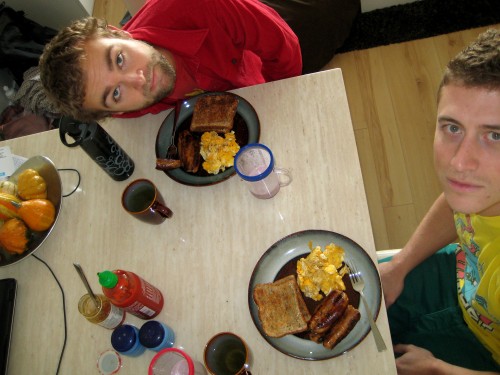
I was fortunate enough to speak with Joey and Todd of Mushroom Blading fame last week. We bullshitted for little more than an hour and I was really keen on transcribing at least a part of the interview. Here is a short excerpt:
You’ve been consistently producing episodes of the “How to be Unpopular” podcast for a couple of years. What keeps you motivated to make these shows week after week?
Joey: HONESTY. It’s the first time in rollerblading media that it’s just this raw, uncensored, honest way of getting ideas out there. And it’s long — they are 2–2.5 hours long, and people can listen to them while they’re at work and it gives a forum for people to just talk about shit in a way that’s a very distinct form of media and communication. You can’t do it with writing. You can’t do it with videos. And you can’t do it with photos. It’s such a distinct form and it’s very therapeutic; I always feel very energetic. I get hooked on it. I find myself talking about podcasts all the time and I’m a podcast junky. They are a very important part of my day. Rollerblading podcasts or not, I love podcasts.
Todd: Like you, I am a huge fan of the podcast medium. I love listening to podcasts, I love doing podcasts. Talking in general is really healthy and I started it because I wanted to talk more. I wanted to force myself to use my voice. I think rollerblading needs to embrace all forms of expression because it’s all one thing. Rollerblading, talking, drawing, music, writing — it’s all expression, it’s all expressing what you feel on the inside and it’s all really healthy. Putting your thoughts into words helps you think more clearly when you force yourself to articulate what you’re thinking. It’s so fucking healthy! Like Joey said, after doing a podcast he feels better. After doing a podcast you feel better. It’s like a therapy session, it really is. People pay people to listen to them talk. People pay a hundred bucks an hour just to listen to them and basically that’s what a podcast is. You are talking and people are listening. There’s a power in that. It’s an expression and you’re forcing yourself to think and articulate and put what you’re thinking into words.
I really think that rollerbladers in general need to try to articulate what they are feeling — what they’re thinking — because they spend so much time putting what they’re thinking and they’re feeling into a physical form…and that’s awesome, that’s great, that’s rollerblading. But at the same time they need to articulate that. Why are they thirty and obsessed with rollerblading? Why are you a teenager and you’re obsessed with rollerblading? There’s a reason; why don’t you try to figure it out? Why don’t you try to talk it out and express it or listen to other people who are trying to figure it out and talking about it. There’s an important place for a podcast in rollerblading. And I find that people are afraid to talk. Professional rollerbladers are afraid to talk in a raw, honest format. It’s a scary thing. I understand that they are afraid to talk. But we’re badasses! We are rollerbladers. We fucking skate up to big drop kinks and we throw hammers and we do big gaps. We do this crazy shit. We truespin fish ledges. But we as a culture truespin fish ledges but we’re afraid to talk. We’re afraid to express our minds. What does that say? We’re afraid to make sounds with our voice?
The not-talking comment is interesting. Was thinking that same thing while watching the BD interviews I dug up — everyone was a lot more open six years ago. Guessing it’s the prevalence of FB and social media and the unyielding maw of criticism that goes along with being in the public eye in this day and age.